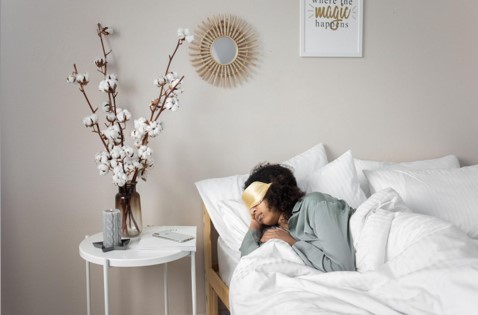How to get a Peaceful night’s sleep

A good night’s sleep rebuilds our bodies, strengthens immunity, improves brain function, and helps to keep us young.
But with all the worries in the world right now, it’s easy to spend the night tossing and turning as we battle to fall asleep, and feeling exhausted in the morning.
Getting a restorative night’s sleep is vital for good health, as studies have linked sleep deprivation to a host of issues ranging from heart disease to high blood pressure and obesity.
With World Sleep Day being celebrated this Friday, here are ways to get the best sleep of your life.
During the day, be mindful of how much caffeine you’re taking in – coffee had at 5pm will still be in your system at 10pm. Aim for a diet containing foods that combat stress and help the body to relax. Foods containing Omega-3 fatty acids and tryptophan (for example nuts, oily fish, chicken, eggs, and milk) can help you fall asleep faster, and stay asleep longer. Regular exercise is an effective way of reducing stress, enabling you to sleep more deeply. Ideally, exercise in the morning, as working out increases hormones that make your body feel more alert.
Did you know that, on average, adults spend a third of their lives asleep? It means that one of the most important pieces of furniture in your house is your bed, and more specifically, the mattress on top of it. If you feel uncomfortable while you sleep at night or wake up with body pain, it may be a sign that you need to buy a new mattress. Like all things, mattresses have a certain lifespan – after around 10 years the materials it’s made from will start to break down, compromising its ability to support your body.
Make your bedroom sleep friendly and train your brain to recognise it as a blissfully calm haven – free of tech, television and work stress. Remove anything with an LED light, which has been shown to disrupt sleep patterns. Even dim artificial light encourages the body to stay alert by making the brain think it’s daylight, thereby interfering with a good night’s rest. Harvard sleep researchers have shown that light at night is part of the reason many people don’t get enough sleep, with short sleep linked to increased risk for depression, as well as diabetes and cardiovascular problems.
Additionally, studies have shown that people sleeping in a cluttered bedroom often take longer to fall asleep than those who have a tidy, less cluttered space. SweepSouth CEO Aisha Pandor suggests doing a deep clean and general tidying up of your bedroom as often as possible. If you don’t have the time to achieve this, hire in help from companies like SweepSouth to ensure that your space is clean, and the air is clear so that you are geared up for a great night’s rest.
If you have any allergies that result in difficult breathing while you sleep, be especially vigilant about getting rid of dust in your room. Bedroom curtains and pelmets are prime dust and allergen traps, points out Aisha. Wipe down the pelmets, then use your vacuum cleaner on a low setting to give your curtains a quick once over.
A guided sleep meditation is a brilliant aid to falling asleep. Try the highly effective 10 Minute Guided Imagery Meditation or the longer, deeply relaxing Guided Sleep Meditation for Insomnia. If you wake up in the middle of the night with the next day’s to-do list looping on repeat in your head, calm whirling thoughts by counting slowly backwards from 100, or try this breathing technique: Breathe in for one count, out for two, in for two, out for four, in for three, out for six, up to in for six and out for 12, then repeat backwards all the way down to one.
Avoid looking at the clock and resist any negative thoughts about how tired you’re going to feel tomorrow. Repeat your breathing exercises or listen to another sleep meditation. Soon, you’ll be relaxed enough to drop off.
By following these tips above, you can rest assured that you’ll have the correct amount of sleep to carry on with your life in a healthy way.





